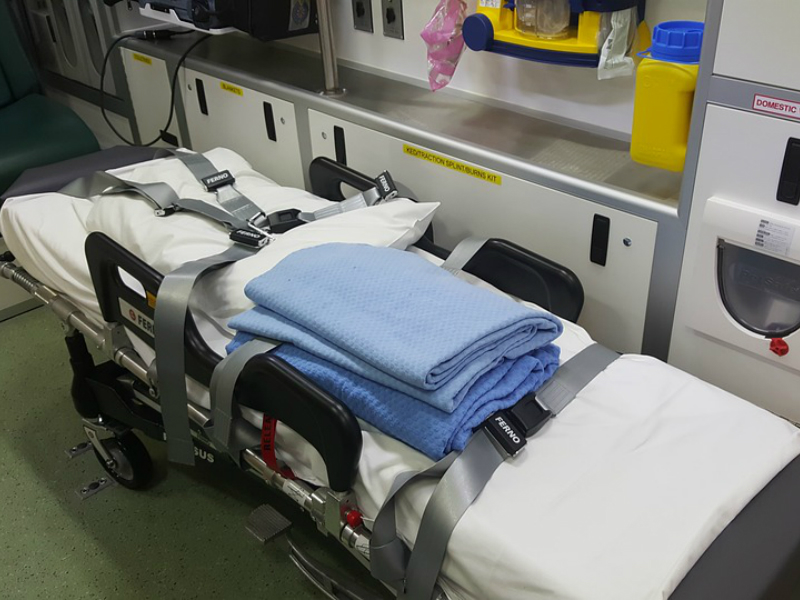The Blumenthals may seem like an average Hasidic family going about their daily lives in Montreal, but there is nothing ordinary about them. In reality, Lipa and Chany Blumenthal are responsible for saving the lives of thousands of Montrealers over the last two decades. As founders of the city’s Hatzoloh unit, they have given the Montreal community security and hope.
Hatzoloh, the worldwide organization providing emergency medical assistance to people in need, was founded on the idea of a sense of responsibility and dedication to Jewish community. On Jan. 18, 1997, the Blumenthals, with the help of other community members, took that responsibility upon their own shoulders when they opened Hatzoloh Montreal.
Lipa and Chany Blumenthal recount the tragic incident that resulted in the founding of Hatzoloh. “Back in 1996,” Lipa explains, “an elderly gentleman, a guest in Montreal, suffered a heart attack and unfortunately by the time first responders arrived, he was already gone. Had there been a Montreal Hatzoloh, we might have gotten to him in time to perform CPR.
“It is unfortunate that it took a tragedy as enormous as that, to wake up the community. We then realized that it was dangerous to live in a city without Hatzoloh.”
After an urgent meeting with local rabbis, synagogues began circulating flyers asking for volunteers to undertake the proper training for this important mission. Within days, 100 people showed up. As training progressed, volunteers began trickling out — the strength and dedication required to become a professional Hatzoloh member isn’t for the faint of heart. Only 25 volunteers made it to the graduating point. Along with several other Hatzoloh members, Lipa Blumenthal earned his New York State EMT (emergency medical technician) license. Hatzoloh of Montreal was officially open for business.
“Of course our members need to be calm and collected under intense pressure,” says Blumenthal. “In addition, we look for mature, stable and dedicated men who have a feeling for medical stuff. To be a competent Hatzoloh member, you always need to update your training.”
Hatzoloh is known for its quick response time. Chany Blumenthal explains how volunteers pull that off: “We have members scattered throughout the community and when a call comes in, the member living the closest to the emergency, takes the call. All our members have flexible job hours, so they can attend Hatzoloh calls 24 hours a day, seven days a week.” Chany took on the crucial role as the first dispatcher of the Montreal Hatzoloh.
She is honest about the sacrifices that being part of Hatzoloh entails. At any given moment, she or her husband might be called away unexpectedly. Once while they were out grocery shopping, Lipa suddenly disappeared. He had gone to help out a person in need. “Shopping isn’t that important when there’s a life at stake, right?” Chany says.
Hatzoloh encounters many halachic complications, especially revolving around Shabbat and Jewish holidays. Team members attend monthly lectures with local Rabbis to review and discuss halachic issues. “One thing is clear,” says Lipa. “According to Halacha you are allowed to — no actually, you must — use the telephone to call for help if there is any kind of medical emergency. It truly bothers me when people come knocking on my door late Friday night with a sick child in their arms. They should be calling Hatzoloh as soon as they think there’s any kind of emergency. Don’t waste time running around. Make the call.”
READ: JAY LENO DONATES AMBULANCE, HELPS RAISE $50K FOR UNITED HATZALAH
The Blumenthals have another important message to share with the community. “For your sake and the sake of your families, take a few moments to put up bright, visible address signs. It might save your life, Lipa begs. “Your address is not a secret,” Chany adds.
Hatzoloh has a great working relationship with the Montreal first responders. “Our goals are the same. We all want the best for our community,” Lipa Blumenthal explains. Hatzoloh helps anyone in need of help, regardless if they are Jewish or not.
In fact, on a quiet evening last year, the Blumenthals were out for a leisurely walk around the block when they saw a woman lying on the ground unconscious. Lipa called for backup and stepped in to help. Within 90 seconds he had backup and the necessary equipment ready to go.
Another woman who was given medical attention by Hatzoloh several months back was taken aback by Hatzoloh’s dedication. “I’m wearing a hijab, I’m clearly not Jewish, but within seconds these brave and compassionate Hatzoloh men stepped in to help me,” she said.
But none of that surprises the Blumenthals. “We are Hatzoloh,” says Liba. “This is what we do.”
